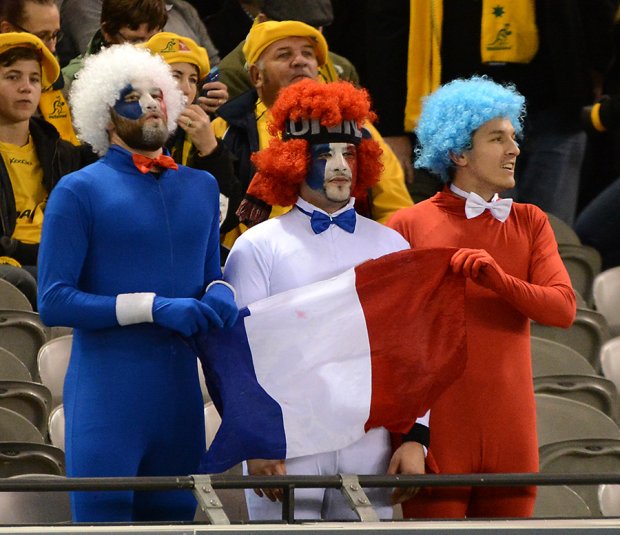They say you have two writing stints with Green & Gold Rugby. Once on the way up and…um. Anyway it’s good to be back.
All Blacks “weakest in history” according to former French international
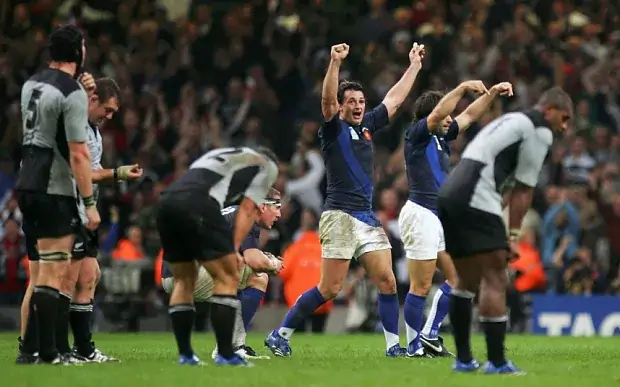
Rugbypass reports the hard-hitting fact that the 2023 All Blacks are the “weakest in history”, at least according to former French international Olivier Magne ahead of the Kiwi v Frog Rugby World Cup opener in Paris on Friday night (05:15 AEST Saturday 9 Sept).
Magne, who was a part of the famous 1999 side that upset New Zealand in the semi-final (and presumably was no stranger to a bit of ophthalmology in the final against Australia), believes that there are only three real contenders for this year’s World Cup.
He predicted a “tough” opening game for the All Blacks as a “humiliation” could be on the cards similar to what France dealt to England during the Six Nations.
“To me, the Big Three of this World Cup is France, SA and Ireland,” said former France flanker in the columns of Midi Olympique. “I am especially worried about this New Zealand team. When I see the level that the XV of France is able to display over 80 minutes today against Australia, with “finishers” who have maintained the same level of performance, and the determination of these players, this opening game could be tough for the All Blacks,” he wrote referring to Les Bleus’ 47-17 victory over the Wallabies.
Magne felt that the 35-7 win by South Africa exposed the All Blacks for who they really are, which called into question the “sham” results of the Rugby Championship. “South Africa’s display against New Zealand is significant for the world of rugby,” he wrote. “Now, isn’t this All Black team the weakest in history? I’m wondering. Really. I feel like New Zealand’s Rugby Championship wins were a bit of a sham.”
This fine publication has investigated and ruled-out the possibility of arrogance by a Frenchman.
World Rugby drugs testing programme yields some positives
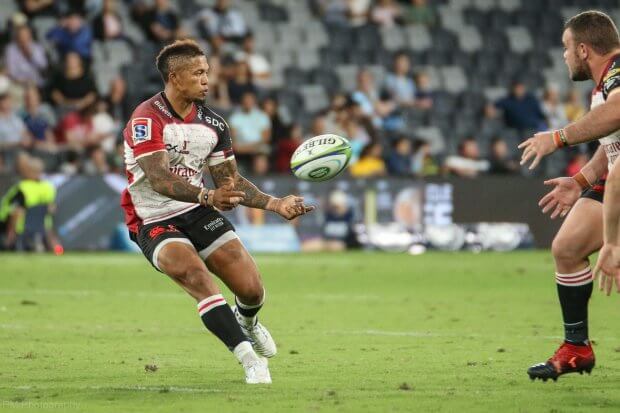
The Guardian reports that senior World Rugby officials are confident their sport is mostly drug-free despite two recent positive tests recorded by international players in the run-up to the World Cup.
Wales’s Rhys Webb and South Africa’s Elton Jantjies are the subject of disciplinary scrutiny following recent initial adverse tests, raising fears that doping might be on the rise across rugby. But the World Rugby chief executive, Alan Gilpin, insists the sport’s Keep Doping Quiet Keep Rugby Clean programme is working and he does not believe the integrity of the 2023 tournament is under threat.
Updated technology which permits testing of old blood samples is also now available to the authorities, for example, permitting the retesting of samples collected at the 2019 competition in Japan. None have thrown up any retrospective positives, raising hopes that doping is not rife in the modern game. “Does rugby have a doping problem? I think the evidence suggests ‘no’,” Gilpin said, carefully. “We’re already confident in the programmes we have in place. We’ve taken really significant steps to make sure every team during this tournament are tested in and out of competition. Our regime [regimen] and our programmes are really extensive. There are occasionally positives – we have seen a couple recently – but I think the evidence would suggest we don’t have a problem in this sport.”
Discipline-wise, meanwhile, World Rugby believes the “bunker review” system for incidents of potential foul play should run more smoothly at the tournament, despite the protracted debate last month following Owen Farrell’s upgraded red card. “We’re confident but I guess we’re not complacent,” Gilpin said. “Any time you’re introducing new processes and procedures there’s always going to be some learnings, and I think there have been. The key difference for us when we come into the tournament is that we get to control the process much more.”
Reds recruit son-of-Wallaby Joe Brial
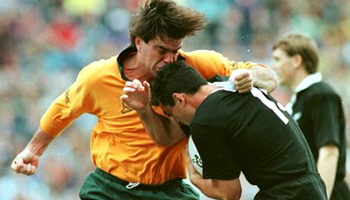
Pravda and the Reds department of propaganda report the signing of former Australian Schoolboy and New Zealand U20s backrower Joe Brial.
The son of Wallabies hardman Michael Brial, Joe will return home after three-years in Christchurch with the Academy of Super Rugby also-rans the Crusaders. The 21-year-old represented the Australian Schools and U18s side in 2019 alongside current Reds pairing Josh “aint no” Flook and Zane “too scary and too nearby for a nickname” Nonggorr.
Queensland Reds head coach and great bit in Cruel Intentions Les Kiss said: “We’re pleased to welcome another promising player in Joe to the Reds. He’s a strong ball-running number eight who will add great depth to our experienced backrow. Joe has been a part of a world-class system at the Crusaders Academy and already knows some of the players here during his time with the Australian Schoolboys. He also comes from a great rugby pedigree with his father Michael having played for the Wallabies, so there’s plenty to like about Joe. “We’re looking forward to seeing his development in our program at Ballymore.”
Brial was educated at The Scots College in Sydney, where he earned selection in the Australian Schoolboys side who defeated their New Zealand counterparts for the first time in seven years back in 2019.
The complex & sensitive Rassie Erasmus
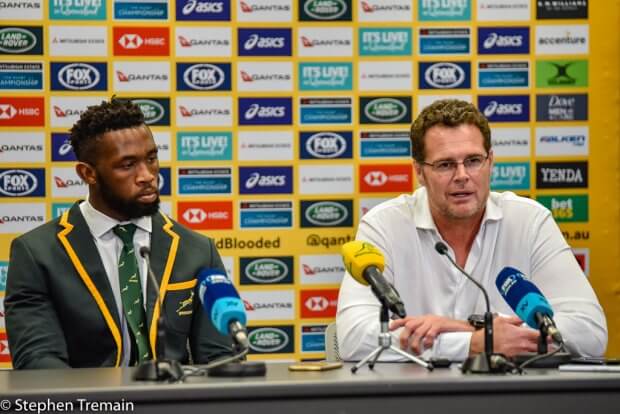
The Guardian has published an interview with South African Director of Rugby and Hydration Rassie Erasmus in which he describes his fear of embarrassment, his reputation as the most controversial coach in world rugby, the pain of living with an alcoholic father and his role in the transformation of South African rugby.
Erasmus describes his father as an “enlightened” man often troubled by the injustices of apartheid which he witnessed while working for the Bantu Administration department where he issued the hated “dompas” (the identity document all black South Africans had to carry). His dad was also horrified by the mocking white laughter which followed South Africa’s first necklacing (when a petrol-soaked tyre was placed around a black man’s neck and set alight) near Despatch in 1985.
“I wouldn’t say that drove my dad to drink,” Erasmus says, “but when you do something you don’t want to do every single day, you probably want to be numb.”
Erasmus began his groundbreaking transformation work in 2013 when he set up his Elite Player Development (EPD) pathway to identify promising under-15 players. Disadvantaged youngsters were nurtured consistently. Erasmus stresses that the coaches he brought in to develop the EPD, including current Springbok head coach, Jacques Nienaber, made considerable contributions in transforming South African rugby to the point where the racial mix of the Springboks is no longer an issue.
The curse of embarrassment was felt acutely by Erasmus during the 2021 British & Irish Lions tour of South Africa. After the Lions narrowly won the first test, which Erasmus believed had been blighted by poor officiating, he was incensed by a perceived lack of respect from the referee towards Captain Siya Kolisi.
When he struggled to receive a response from match officials after the test he made a video featuring 28 contentious clips. He sent it only to six people involved in the officiating but in the introduction he implied it could be shared with Supersport, the television channel. “That was my biggest f*ck-up,” he says. “Not making the video but saying those words.” After the hour-long video was leaked on the internet, World Rugby concluded he had brought the game into disrepute. Erasmus was suspended for two months and banned from match days for a year. The punishment devastated him – as did the reputational damage.
“It was very painful but I still think the video was one of the best things I could do for the Springboks at that stage. It was never meant to go public but the words in the video asked the officials to please take us seriously before the second Test. I wasn’t guilty of distributing the video. I was found guilty of not preventing the video from entering the public domain. The purpose was never to embarrass anybody but the video hurt a lot of people because it got out. That’s what I’m ashamed of.”
Erasmus insists his reputation for trying obsessively to control games is unwarranted. He has always hunted for an edge – whether using coloured lights on the stadium roof to relay messages when coaching the Cheetahs, being a water-carrier running on to the field to help the Springboks, or packing his bench with a Bomb Squad of forwards. “People see it like that,” he says of his puppet-master persona, “but ask my players and you will see it’s our [joint] plan. When they’re on the field we try to help them. All coaches do it. I don’t think it’s controlling. It’s all about our togetherness.”

